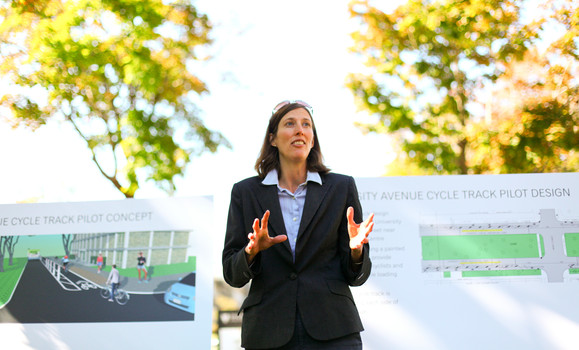Dalhousie is about to enter its third century next year — and ensuring the university is around for centuries to come means working to reduce its environmental footprint and support sustainable operations.
The Office of Sustainability, founded in 2009, works to incorporate sustainability concepts and criteria into university policy and planning, building and retrofit projects, and general operations across the university.
It’s work that’s been recognized with a wide variety of honours and designations: a gold rating from STARS (the higher education sustainability ratings system), awards from from Efficiency Nova Scotia (including a leadership award for its executive director, Rochelle Owen) and, most recently, Dalhousie being named one of Canada’s greenest employers for the second year in a row.

Office of Sustainability Executive Director Rochelle Owen.
To mark Earth Day, the Office of Sustainability held its annual celebration event on Friday, April 21, looking back at some of its work from the past year. Here are some of the highlights:
Climate Change Plan
“If I were to highlight anything it would be our progress to meet our climate targets,” says Owen.
Indeed, some of the most prominent successes in recent years have been around the university’s Climate Change Plan [PDF], approved in 2010. Currently, Dalhousie has over 10 energy and climate change projects underway, with more than 15 completed since the University and College’s Climate Change Statement for Canada was signed in 2009.
With 2016 in the rear-view and 2020 on the horizon, Dalhousie University is right on track for meeting its projected greenhouse gas emission reductions. In the 2010 plan, the university committed to reducing emissions by 20 per cent in 2016, 50 per cent in 2020, with an aggressive goal of zero emissions by 2050.
The second version of the plan is being released later this year.
“The 2017 plan adds a few more strategies,” says Owen. “The Agricultural Campus is added to the discussion, it reaffirms our aggressive targets from 2010 and adds a bit more on carbon offsets.”
Learn more: Energy & Climate Change
The Big Switch
One of the most successful projects completed in 2016-17 was the Big Switch, where the Office of Sustainability partnered with Facilities Management in a joint initiative to complete a waste management makeover. The work made its way through Studley and Carleton campuses after previously being completed on Sexton and the Agricultural Campus.
“It’s been a seven-year process, with 13 steps,” says Owen. “Almost 40 people were involved. A lot of student research. And we’re almost done which is a great accomplishment.”
Supporting both continuous learning and sustainable practices, the university improved signage at waste sorting stations to complement the four-bin sorting system — for paper, recyclables, organics, and garbage. The Office of Sustainability also created a Waste Management Online Module, including a waste management guide, educational video and quiz.
“Removing single-use garbage bins was quite a large undertaking and logistical operation,” says Owen, explaining that most people are inclined to put waste in the bin closest to them. “Removing that opportunity creates a lot better compliance, so that was part of the Big Switch.”
The Big Switch is almost complete, with the team in custodial now reviewing the spaces to improve any deficiencies. This initiative has increased diversion from the landfill, makes Dal more compliant with Halifax bylaws, uses less bags overall and has increased education surrounding waste management.
Learn more: Waste management
Transportation Demand Management Action Plan
Transportation Demand Management, or TDM, is about planning and supporting the various ways students, faculty, staff and guests make their way to and from campus — and working to encourage more sustainable options.
The Transportation Demand Management Action Plan [PDF] was prepared by the Dalhousie University Office of Sustainability in 2016, outlining activities, project ideas and opportunities based on the 2011 University TDM plan.
“We’re working on more smart metering and new bus and bike infrastructure,” says Rochelle.
New bike and bus infrastructure has been implemented at Howe Hall off Coburg Rd. and Gerard Hall. Then there is the University Avenue Protected Bike Lane initiative, a pilot project in partnership with HRM. The lane just had its final piece installed: a new Eco-Counter to track use.
Learn more: Transportation
Energy projects
Steam pipe insulation
All Halifax campus buildings stocks are connected to one district energy system, with tunnels tunnels connected by steam pipes.
“Steam is quite high energy when it leaves,” says Owen. “Just like in your house, you want to insulate the pipe because you can lose a lot of heat if it’s bare.”
The Office of Sustainability helped to create custom-made fittings to cover hundreds of little spaces where valves and other pieces weren’t insulated. The steam pipe insulation is almost complete.
Lighting upgrade for the AC
The Agricultural Campus in Truro has almost completed a full lighting upgrade.
“Higher energy and incandescent bulbs were replaced with more efficient light emitting diodes (LED) bulbs and high efficiency T8s and controls,” says Owen.
This retrofit was designed to decrease CO2 emissions and reduce energy costs.
Halifax Dump and Run
The 16th annual Halifax Dump and Run — Halifax’s largest community garage sale — took place on April 30, where all sorts of materials from residences and community donations are brought to the Studley gymnasium and sold as a fundraiser. This giant garage sale, which attracts thousands of people each year, works toward diverting waste from local landfills and promoting Halifax’s social and environmental well-being.
At the 2017 Dump and Run over 1,100 people attended and over $10,000 will be donated to charity groups.
Want to learn more?
More information about projects underway can be found at the Office of Sustainability website.
Comments
comments powered by Disqus

